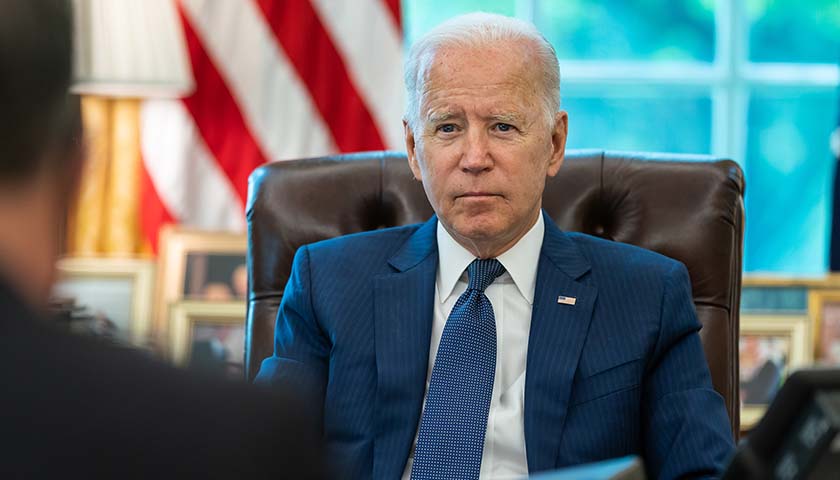NASHVILLE, Tennessee – While more than 80 bills in total were filed in each chamber, it was a bill filed by Lt. Governor and Speaker of the Senate Randy McNally (R-Oak Ridge) and Speaker of the House Cameron Sexton (R-Crossville) that was amended to become an “omnibus” bill to incorporate provisions included in most of the other bills.
The bills were all filed for consideration during the Third Extraordinary Session of the Tennessee General Assembly focused on COVID-related issues which began Wednesday with organizational floor sessions of the House and Senate.
HB 9077 and SB 9014, sponsored by Sexton and McNally respectively, started as a caption bill addressing unemployment compensation for an employee who lost their job for their refusal to receive a COVID shot.
HB 9077 was assigned to the 21-member House COVID-19 Committee, and was the first of the 41 scheduled bills the committee took up. After starting about an hour late due to technical issues with the electronic system legislators use to track legislation, Rep. Jason Zachary (R-Knoxville) presented the bill to the committee and in front of several dozen on-lookers in House Hearing Room I after opening with a prepared statement.
As Zachary explained, following five pages of definitions in the amendment that makes the bill, the legislation that will fall under a new Title 14 in Tennessee Code Annotated states that the General Assembly finds:
(1) Setting forth the rights of people in the context of COVID-19 restrictions in a statute assists the citizens of this state in the enforcement and protection of their rights and creates a safe harbor for those desiring to avoid litigation;
(2) Tennessee, as a great southern state within our federal system of government, is free to enact laws to protect the health and safety of its citizens under the police powers inherent to all states of a federal system of government; and
(3) Consistent with our constitutionally recognized and inalienable right of liberty, every person within this state is and must remain free to choose or to decline to be vaccinated against COVID-19 without penalty or threat of penalty.
The bill goes further to state the purpose:
The purpose of this title is to safeguard the constitutional rights and liberty interests of persons during the COVID-19 pandemic. This title must be construed broadly to effectuate the purpose described in this section.
The main provision of the bill is relative to vaccines is that:
- A governmental entity shall not mandate that a person receive a COVID-19 vaccine or that a private business or school require proof of vaccination as a condition of access to the premises, facilities or services.
- A private business, governmental entity or school shall not compel a person to provide proof of vaccination.
- While government entities are prohibited from mandating a vaccine, a private business can still mandate a vaccine or negative test, but cannot require that a person present proof of vaccination.
Other provisions of the bill include:
- A private business or governmental entity shall not require a person to wear a mask as a condition to access the premises, facilities or services.
- Further, an employer cannot require an employee to wear a mask as a condition of employment or take adverse action against the employee for not wearing a mask.
- In either case, an exception is made when the governor has declared a state of emergency and a county has a rolling 14-day average of at least 1,000 new infections per 100,000 residents defined as “severe” at which time the mask requirement can be in effect for no more than 14 days, but can be renewed if the “severe” conditions continue to exist.
- Masks cannot be required by schools either, except on a school-by-school basis and by written request of the principal to the school board that then adopts a policy for no more than 14 days.
- The school must provide to those 12 years and older N95 masks and age-appropriate masks that offer similar protection for those between the ages of 5 and 12 as well as reasonable ADA accommodation.
- Unemployment benefits will be available not only prospectively but retroactively to those employees who left their employment voluntarily or involuntary due to their employer’s COVID-19 vaccine requirement.
- The sole authority to determine quarantine guidelines is assigned to the Commissioner of the Department of Health.
- The recommendation, prescription, offering or administering of monoclonal antibodies to a patient for treatment of or prophylactically against COVID-19 shall be left to the healthcare provider exercising their independent professional judgement.
- In a move against the mature minor doctrine, COVID-19 vaccines shall not be administered by a healthcare provider to a minor without written consent from a parent or guardian.
- The legislation previously passed by the legislature establishing a clear and convincing standard relative to COVID liability is moved to the new Title 14.
- An anti-commandeering provision prohibits the use of funds, personnel or property of the state or any political subdivision from being used to implement, regulate or enforce any federal law, executive order, rule or regulation that mandates “the administration of a COVID-19 countermeasure.”
- Any person injured as a result of a violations of the portion of the legislation that prohibits vaccine or mask mandates is entitled to a private right of action.
- Additionally, any private business found to have violated the vaccine and mask provisions and to have received state funding by way of state grants or state tax credits in the fiscal year the violation occurred will be ineligible for state funding for the next two fiscal years.
One major exemption to any provision of the legislation included in the House version as 14-6-102 is afforded to private businesses, governmental entities or schools, if necessary, as a condition to continue to receive federal funding. The Senate version currently does not include the section on exemptions due to potential loss of federal funding.
All providers that receive funding from the Centers for Medicare and Medicaid are exempt from the legislation.
After about 40 minutes of discussion, HB 9077 passed the House COVID-19 Committee on a voice vote, where all Republicans appeared to vote in the affirmative and two Democrats requested to be recorded as a no vote.
SB 9014, co-sponsored and carried by Senate Majority Leader Jack Johnson (R-Franklin), admitted he had been concerned about instituting regulations on businesses but said that this is a unique situation that he has wrestled with.
Johnson said he and others arrived there, in part, due to the balance struck between personal medical freedom and the rights of businesses.
The bill was presented by Johnson to the Senate Commerce and Labor Committee, where it passed with a 7 to 1 vote on to the Judiciary Committee where it passed with a 7 to 2 vote on to the Health Committee.
The Senate Health Committee didn’t take up the bill until after 7 p.m. The bill finally passed out of the committee close to 8:30 p.m. with a vote of 7 to 1 on to the Senate State and Local Government Committee.
The bill, which now includes a Senate Health Committee amendment that would prohibit a licensing board or disciplinary subcommittee from taking any action against a physician’s license based solely on the physician’s recommendations to a patient regarding treatment for COVID-19 and prohibits a pharmacy from blocking or attempting to block a patient’s access to COVID-19 treatments, will be taken up on Friday.
Sen. Rusty Crowe (R-Johnson City) sponsored SB 9086, the companion bill to HB 9080 by Rep. Bud Hulsey (R-Kingsport) that addressed the same issue as the amendment to SB 9014. As Crowe stated in presenting the amendment, because the omnibus bill is going to be going to conference committee, he asked for a favorable vote.
HB 9029 sponsored by Rep. Debra Moody (R-Covington) would have reduced the period the governor could declare a state of emergency from 60 days to 21 days and would have required the legislature to authorize any extension via joint resolution and prohibit the governor from shutting down businesses, restricting citizens freedom to travel and assemble or expend funds without approval by the General Assembly.
While the bill passed the House Emergency Orders Committee on to Finance, Ways and Means, the companion SB 9024 sponsored by Sen. Mark Pody (R-Lebanon) failed in the Senate State and Local Government Committee for lack of a motion.
Other bills sponsored by Sexton and McNally that advanced on Wednesday include:
HB 9071 / SB 9008 – allows the attorney general to petition the court for appointment of district attorney general pro tem if a district attorney general peremptorily and categorically refuses to prosecute all instances of a criminal offense without regard to facts or circumstances; requires the court to appoint a district attorney general pro tem if the court finds the district attorney general has refused to attend and prosecute according to the law.
HB 9072 / SB 9009 – requires partisan elections for all school board members.
HB 9073 / SB 9010 – adds cash as a form of eligible collateral for purposes of the collateral required to be pledged to secure public deposits; decreases the collateral pledge level for public deposits held by collateral pool banks.
HB 9074 / SB 9011 – requires the attorney general and reporter to seek a writ of mandamus or injunction from a court of competent jurisdiction to compel a public official who knowingly refuses to enforce and execute the orders and rules issued in an emergency to do so; requires the attorney general and reporter to seek a civil penalty of no more than $10,000 for failure to enforce or execute emergency orders and rules and an additional $1,000 per day that the official refuses to comply with the writ of mandamus or injunction.
HB 9075 / SB 9012 – decreases the time a state of emergency may continue under an executive order or proclamation issued by the governor from 60 days to 45 days.
HB 9076 / SB 9013 – grants governor exclusive jurisdiction to issue orders and directives regarding county health departments during a pandemic; vests county mayors with authority to issue orders relative to the health and safety of county residents; vests commissioner of health with exclusive authority to quarantine persons and businesses for purposes of COVID-19.
More than two dozen bills were taken off notice in the House, but more than three dozen more bills have yet to be addressed.
Bills and resolutions introduced in the Third Extraordinary Session of the 112th General Assembly can be viewed here.
House and Senate floor sessions are scheduled for Friday to take up bills put on the calendars by the respective Calendar and Rules committees. The schedules and calendars for the House and Senate can be viewed here.
– – –
Laura Baigert is a senior reporter at The Star News Network, where she covers stories for The Tennessee Star and The Georgia Star News.









[…] legislation was amended to become an “omnibus” bill to incorporate provisions included in several other […]
I cannot say what I really think of these 2 clowns- especially Sexton. My comments would be deleted…
Here we go again. The top dogs are going to water down the individual bills to the point they are ineffective. I particularly dislike their inclusion of specific numbers of cases per a certain number of people. Who is to confirm such numbers? We saw in the COVID reporting numbers that were not valid. For example, we were given the number of positive tests but those were not clarified as to multiple positive tests for an individual. In other words a person could test positive 5 times and that was counted as 5 cases instead of 1.
I have ZERO confidence in the legislature. They invariably weaken strong bills to the point that they are a waste of the paper they are written on.
Besides, I did not elect Sexton or McNally as my representative. Their use of an omnibus bill is an insult.
Don’t these clowns even pay attention to the Chambers of Commerce and other highly conservative organizations? These bills are not needed.
Ted – The Chamber has not been a conservative organization in years and years. All that bunch cares about is big business and even bigger government.
Ted, the Chamber of Commerce is anything but conservative. I suppose you’re one of those who think CNN is straight down the middle too.